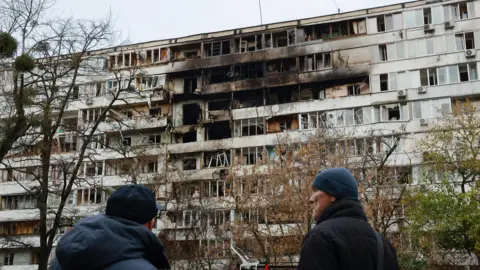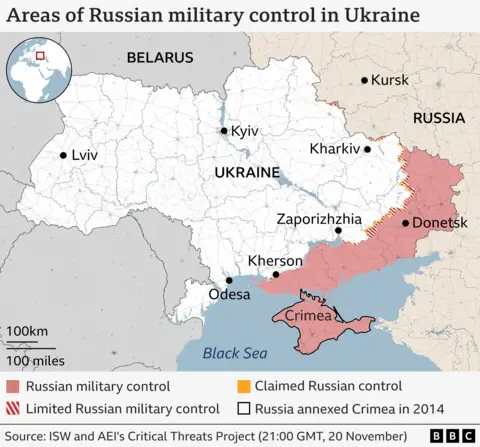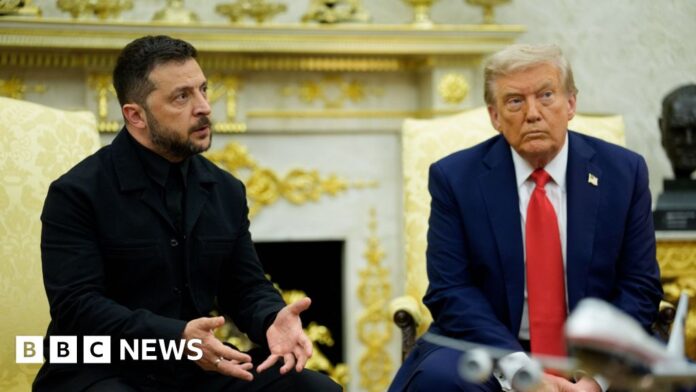Ukraine’s security chief says he is hoping to arrange for President Volodymyr Zelensky to visit the US “at the earliest suitable date” this month, as diplomatic attempts to end the war continue.
Rustem Umerov, the head of Ukraine’s security council, said on Tuesday the US and Ukraine had reached “a common understanding on the key terms of the agreement discussed” at previous talks in Geneva.
The White House has not commented on the prospect of Trump-Zelensky talks.
Meanwhile, the US has confirmed its officials are set to meet Russian representatives in Abu Dhabi.
Fighting continued overnight, with Russia and Ukraine trading air attacks.
Officials in Kyiv said at least six people had been killed in Russian strikes on the city, while Russian officials said at least three had been killed in a Ukrainian strike in the Rostov region.
Ukraine’s national security chief Rustem Umerov said his team “look forward” to organising Zelensky’s US visit “at the earliest suitable date in November to complete final steps and make a deal” with US President Donald Trump.
In a social media post on Tuesday, he wrote that US and Ukrainian delegations have reached “a common understanding on the core terms” of the peace plan, referring to their meeting in Geneva on Sunday.
A US official told the BBC that Ukraine had “agreed to a peace deal”, adding there were still “some minor details to be sorted out”, without giving specific details.
However, the gap between the terms that Ukraine and Russia will accept is still very wide and the Kremlin is unlikely to agree to the kind of deal that Kyiv may approve.
Leaders in Kyiv and Europe had criticised the initial draft of a peace plan, which they said was too favourable to Russia.
Counter-proposals – reportedly drafted by the UK, France and Germany – excluded any recognition of Russian-held regions, raised Ukraine’s permitted army size, and left the door open to Ukraine joining Nato.
Zelensky welcomed the proposed changes to the controversial 28-point US peace plan.
“Now the list of necessary steps to end the war can become doable,” Zelensky said. “Many correct elements have been incorporated into this framework.”
A Kremlin official rejected the amendments as “completely unconstructive”. However, a US official on Tuesday told the BBC that its team would be meeting Russian representatives in Abu Dhabi to further discuss the plan.
Russian Foreign Minister Sergei Lavrov – who is not attending the meeting – said the Kremlin has yet to receive the “interim” version of the revised plan, adding that Moscow’s view was that it should reflect the “spirit and letter” of the Alaska talks between Trump and President Vladimir Putin in August.
Separately, a virtual “coalition of the willing” meeting of Ukraine’s European allies will also be taking place on Tuesday to discuss developments, UK Prime Minister Sir Keir Starmer said.
Earlier in the day, Zelensky said he had a “good and very productive” conversation with Starmer, in which they discussed the agenda for the meeting.
 EPA
EPAThe latest round of talks come as Russia and Ukraine exchanged overnight strikes.
Kyiv’s military administration chief, Tymur Tkachenko, said a fire had broken out at a high-rise residential apartment building in the Dniprovskyi district, forcing the evacuation of its residents.
Emergency services on the scene said 18 people had been rescued, including three children, and the search for victims was ongoing after the fire had been contained.
Residents of a high-rise apartment in the city’s central Pechersk district were also evacuated after it was set ablaze during the strikes according to Kyiv’s mayor Vitali Klitschko.
He added that the building suffered damage to the upper floors, but the fire had been extinguished.
Ukraine’s air defence units responded to the attack as explosions were heard across Kyiv and residents were urged to take shelter in underground car parks and bunkers.
Ukraine’s Ministry of Energy also confirmed a “massive, combined enemy attack” on the country’s energy infrastructure facilities.
According to Zelensky, 22 missiles and more than 460 drones were launched at Ukraine overnight.
Nato scrambled four planes over Romania – the third time in four days its planes have been sent to intercept drones in Ukraine’s border region. Six Russian drones were also detected in Moldova.
Meanwhile, the Russian defence ministry said it had intercepted 249 Ukrainian drones overnight, including over the Black Sea and Kursk.
In Russia’s Rostov region, the death toll from a Ukrainian strike had risen to three, after initial reports of one death, officials said.
According to Russia’s acting governor of the Rostov region Yuri Sliusar, two died in hospital.
One of the deaths was reported in the city of Taganrog, where mayor Svetlana Kambulova vowed “necessary response measures”.
Another 10 people were injured in the strikes.
In the southern Krasnodar region, Governor Veniamin Kondratyev described Ukraine’s overnight bombardment “one of the Kyiv regime’s most sustained and massive attacks”.

The proposed peace plan – drafted by US and Russian officials last month – had caused much consternation in Ukraine and among its European allies, who said it was too favourable to the Kremlin.
But White House press secretary Karoline Leavitt rejected the idea that the Trump administration was “not engaging with both sides equally in this war”.
After talks in Geneva between the US and Ukraine concluded, Trump suggested that “something good just may be happening” but added: “Don’t believe it until you see it.”
As he welcomed the proposed changes, Zelensky said the “main problem” was Putin’s demand for legal recognition of the territory Russia had taken.
Russia has consistently demanded full Ukrainian withdrawal from the whole of the eastern Donbas, made up of Donetsk and Luhansk regions. Moscow’ forces also control Crimea and large parts of two other regions, Kherson and Zaporizhzhia.
The European Union’s foreign policy chief Kaja Kallas said the final peace plan should make it impossible for Moscow to invade again, and that Russia should “definitely not” rejoin the G8.
Speaking to BBC Radio 4’s Today programme on Tuesday, she said: “We can’t go back to business as usual… how could you imagine that?”
Tens of thousands of soldiers and thousands of civilians have been killed or injured, and millions of people have fled their homes, since Russia’s full-scale invasion began in February 2022.



